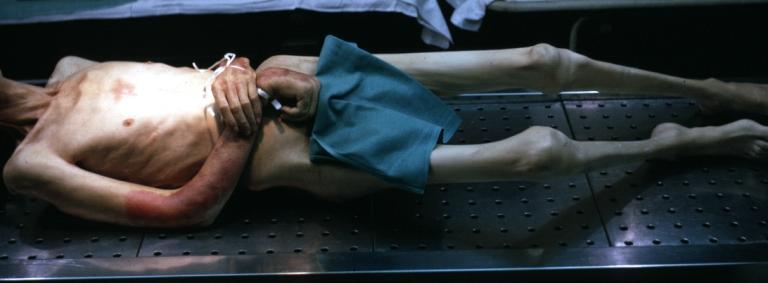Cachexia
| Cachexia | |
 | |
|---|---|
| ICD-10 | R64 |
| ICD-9 | 799.4 |
|
WikiDoc Resources for Cachexia |
|
Articles |
|---|
|
Most recent articles on Cachexia |
|
Media |
|
Evidence Based Medicine |
|
Clinical Trials |
|
Ongoing Trials on Cachexia at Clinical Trials.gov Clinical Trials on Cachexia at Google
|
|
Guidelines / Policies / Govt |
|
US National Guidelines Clearinghouse on Cachexia
|
|
Books |
|
News |
|
Commentary |
|
Definitions |
|
Patient Resources / Community |
|
Directions to Hospitals Treating Cachexia Risk calculators and risk factors for Cachexia
|
|
Healthcare Provider Resources |
|
Causes & Risk Factors for Cachexia |
|
Continuing Medical Education (CME) |
|
International |
|
|
|
Business |
|
Experimental / Informatics |
Editor-In-Chief: C. Michael Gibson, M.S., M.D. [1]; Associate Editor-In-Chief: Cafer Zorkun, M.D., Ph.D. [2]
Overview
Cachexia (Template:PronEng) is loss of weight, muscle atrophy, fatigue, weakness and significant loss of appetite in someone who is not actively trying to lose weight. It can be a sign of various underlying disorders; when a patient presents with cachexia, a doctor will generally consider the possibility of cancer, certain infectious diseases (e.g. tuberculosis, AIDS) and some autoimmune disorders, or addiction to drugs such as amphetamines or cocaine. Cachexia physically weakens patients to a state of immobility stemming from loss of appetite, asthenia, and anemia, and response to standard treatment is usually poor.
Disease settings
Cachexia is often seen in end-stage cancer, and in that context is called "cancer cachexia". It was also prevalent in AIDS patients before the advent of triple-therapy for that condition; now it is seen less frequently in those countries where such treatment is available. In those patients who have Congestive Heart Failure, there is also a cachectic syndrome. Also, a cachexia co-morbidity is seen in patients that have any of the range of illnesses classified as "COPD" (chronic obstructive pulmonary disease), particularly emphysema. Some severe cases of schizophrenia can present this condition where it is named vesanic cachexia.[1]
In each of these settings there is full-body wasting, which hits the skeletal muscle especially hard, resulting in muscle atrophy.
Mechanism
The exact mechanism in which these diseases cause cachexia is poorly understood, but there is probably a role for inflammatory cytokines such as tumor necrosis factor-alpha (TNF-α) -which is also nicknamed cachexin for this reason-, Interferon gamma (IFNɣ), and Interleukin 6 (IL-6), as well as the tumor secreted proteolysis inducing factor (PIF).
Related malnutrition syndromes are kwashiorkor and marasmus, although these do not always have an underlying causative illness; they are most often symptomatic of severe malnutrition.
Those suffering from the eating disorder anorexia nervosa appear to have high plasma levels of ghrelin. Ghrelin levels are also high in patients who have cancer-induced cachexia (Garcia et al 2005).
Causes
Common Causes
Causes by Organ System
Causes in Alphabetical Order
- Acute myelosclerosis
- Addison's disease
- AIDS
- Amphetamine
- Andrade's disease
- Anorexia nervosa
- Atypical pneumonia
- Breast cancer
- Brucellosis
- Cancer cachexia
- Cardiac cachexia
- Celiac disease
- Chemotherapy
- Chronic diarrhea
- Chronic lymphocytic leukaemia
- Chronic renal failure
- Cidofovir
- Colorectal cancer
- Congestive heart failure
- COPD
- Crohn's disease
- Cystic fibrosis
- Depression
- Endocarditis
- Familial amyloid polyneuropathy
- Hepatitis B
- Kaposi sarcoma
- Leishmaniasis
- Leukemia
- Liver cancer
- Lung abscess
- Malignancy
- Mastocytosis
- Mercury
- Metabolic acidosis
- Metastatic neoplasm
- Multiple sclerosis
- Mycobacterium tuberculosis
- Myeloma
- Pancreatic cancer
- Paraneoplastic syndrome
- Pergolide
- Polyarteritis nodosa
- Radiotherapy
- Sarcoidosis
- Sepsis
- Starvation
- Stomach cancer
- Systemic lupus erythematosus
- Trypanosomiasis
- Tuberculosis
- Visceral leishmaniasis
References
- ↑ "Vesanic" means demented.
Related Chapters
Resources
- Manifestations of Cachexia, from Cancer Medicine
- Treatment of Cachexia, from Cancer Medicine
- Scientists find key to 'wasting syndrome' seen in cancer, AIDS (U.S. Department of Veterans Affairs)
- Vitamin E and Disease Treatment (Oregon State University)
- BioMedCode Animal Models for Cachexia / MOF (Tg211, TgE1355)
- Medicine Net.com - Definition of Cachexia